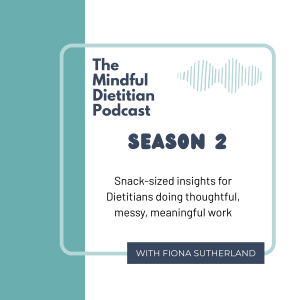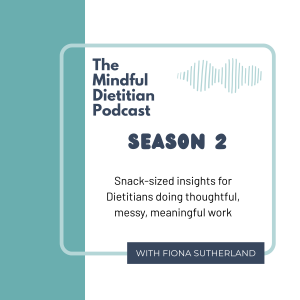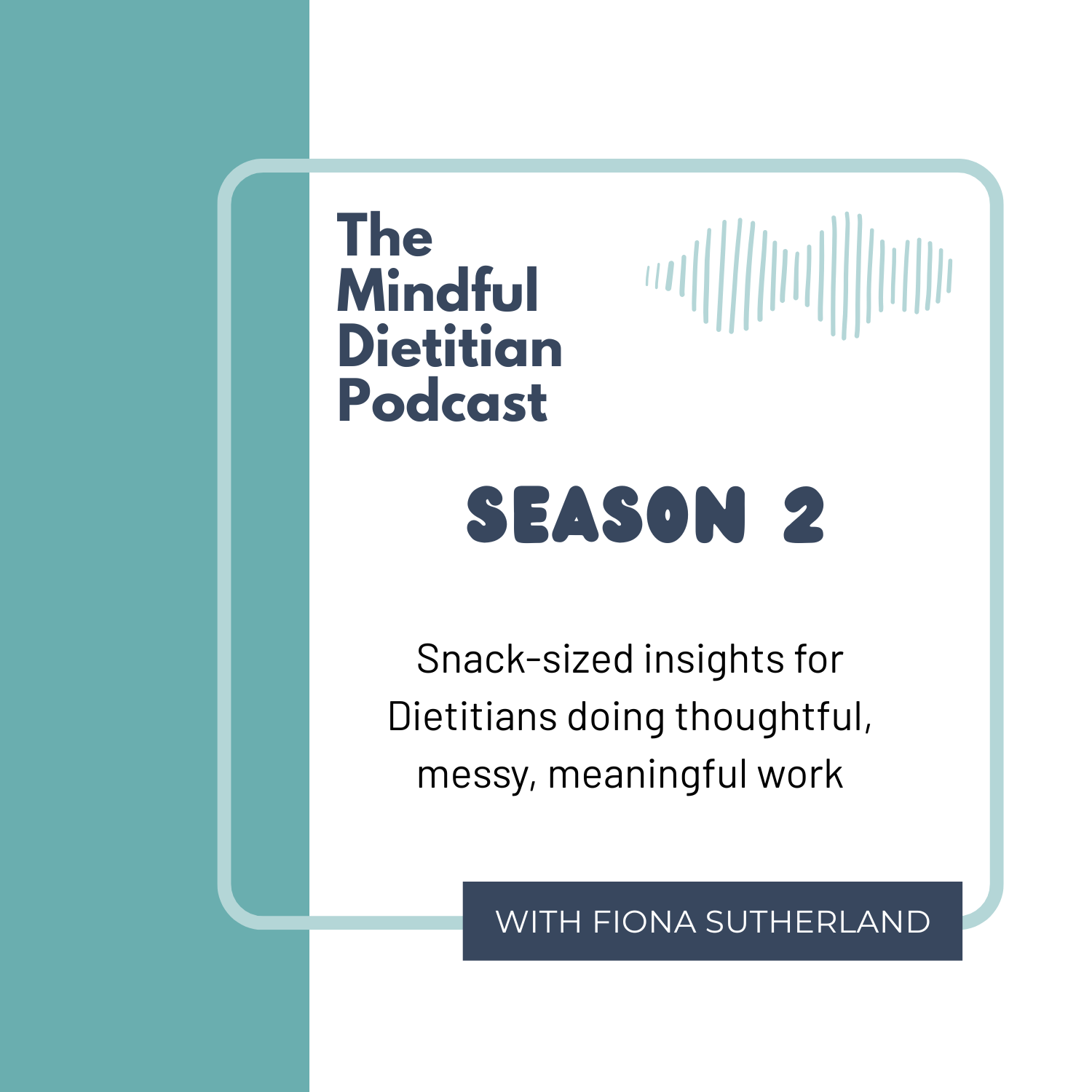Episodes

Monday May 05, 2025
I'm back! Imperfect, messy snack-sized insights for Dietitians
Monday May 05, 2025
Monday May 05, 2025
I'm back and this time there's no fluff. Just 10-15 minutes of a topic that I want to rave on about.
This first one's about the mess and the meaning.

Wednesday Aug 10, 2022
Diet Culture in Schools with Gwen Kostal
Wednesday Aug 10, 2022
Wednesday Aug 10, 2022
Help! My kid has been sent home with a serve of diet culture!
If you recognise this, either as a parent, or as a health professional, you'll love this episode with Gwen Kostal from Dietitians 4 Teachers. Educators, we love you! And we would love to work with you to make our schools and education settings a safer place for more kids.
In this episode, Gwen shares her career trajectory, the intention behind D4T; Dietitians 4 Teachers, how no educator intends to cause harm, what we can offer teachers as we begin to work shoulder-to-shoulder, questions dietitians can reflect on when wanting to work in schools, questions we can ask teachers to learn more about their needs and concerns, an introduction to a helpful change management framework, ‘Best Practice’ for giving school talks and presentations and how we as dietitians can best support our student clients when they are in the classroom/school setting.
Here Fi and Gwen chat about;
- Gwen’s trajectory from primary care dietetics into problem solving and the intention behind @Dietitians4Teachers.
- The importance of working beside teachers and educators and why Gwen’s work is grounded in support and validation.
- How no educator intends to cause harm, acknowledging the impacts of diet culture on educators and the trouble with ‘health’ and ‘healthy eating’ being assumed knowledge in the classroom.
- The permission giving statement we can offer teachers and educators in the first instance to reduce shame and defensiveness and the ways in which we can begin to partner and work shoulder-to-shoulder.
- Important reflective questions we can ask ourselves as dietitians when we have a desire/interest to work in schools.
- How change work must start with humans and what we must offer teachers to empower change within the classroom/school.
- The vital questions we can ask teachers when it comes to resources and offerings and how we can encourage resistance and rejection when using existing curriculum and lessons.
- Change Management Framework’s and an introduction to an effective method; ‘What? So What? Now What?
- Gwen gently guides us through ‘Best Practice’ for initiating and providing school presentations/talks.
- How dietitians can best support their school student clients when they notice concerns within the school/classroom settings.
Connect with Gwen:

Monday Mar 07, 2022
Responsive Feeding & Reflective Practice with Grace Wong
Monday Mar 07, 2022
Monday Mar 07, 2022
Grace Wong on inclusive, flexible feeding modalities and how we can bring a more reflective spirit to our work.
In this episode, Grace discusses the ARFID (Avoidant Restrictive Food Intake Disorder) umbrella diagnosis and its shortcomings, Responsive Feeding Therapy (RFT); how it was developed. who was part of its curation and its rationale, what each of the 5 interrelated values offers, why moving away from manualised approaches can help more people and how dietitians can use their supervision space well.
In conclusion, Fi and Grace each share how they both engage in their own reflective work.
Here Fi and Grace chat about;
- What Grace has been up to since her last chat with Fi on TMD podcast (2017).
- Avoidant/Restrictive Food Intake Disorder (ARFID); Grace explains what the DSM-V diagnosis is, along with its main strength and its shortcomings.
- Responsive Feeding Therapy (RFT); Grace introduces us to the curated framework developed in collaboration with Dr Katja Rowell, Dr Jo Cormack, and Heidi Moreland and the rationale behind its development.
- The 5 interrelated values at the core of RFT; Grace provides us with context as to why RFT has been developed in this way.
- Grace steps us through each value;
- Autonomy; why this is first and foremost and how autonomy creates safety.
- Relationship; the harm which can occur when feeding is taken outside of relationships.
- Internal motivation; how it helps behaviour change to be more sustainable and helpful long-term.
- Individualised care: how centring our client story can guide us as practitioners
- Competence; how this works and is weaved in with RFT
- Moving away from a one-way model and manualised approach; why not being manualised is the best approach for a whole lot of people.
- How dietitians can use their supervision space well and how we can unpack in supervision to not get in our clients way.
- Reflective work; Fi and Grace both share examples of how they carry out their own reflections and how its okay to do this work individually, collaboratively and in supervision.
More about Grace:
Grace Wong MSc, RD, CEDS-S is a registered dietitian specializing in feeding and eating disorders. She works with all ages and provides medical nutrition therapy from a weight inclusive lens. Grace is experienced in working with a broad range of eating challenges along with complex co-existing conditions including medical conditions, developmental concerns, mental health concerns, addictions, and trauma. Besides her clinical practice, she provides training and supervision for health professionals in Canada and overseas.
Connect with Grace:

Wednesday Feb 16, 2022
Affirming Neurodivergence with Naureen Hunani
Wednesday Feb 16, 2022
Wednesday Feb 16, 2022
Naureen Hunani on how the diversity of the human brain, and shifting from shame, to affirmation.
In this episode, Naureen discusses Neurodiversity, Neurodivergence and The Neurodiversity Movement/Paradigm and how they differ from each other, how generalising and stereotypes are unhelpful, why we need to consider all underlying challenges for neurodivergent people when it comes to food, eating and their body, the power of social media and expertise by lived experience for the neurodivergent community, what screening can look like and how dominate autonomic responses can show up for neurodivergent children.
Here Fi and Naureen chat about;
- ‘A week in the Life of Naureen’; what it encompasses and how Naureen has honoured herself and her own neurodivergence through the type of work she engages in.
- Neurodiversity, Neurodivergence and The Neurodiversity Movement/Paradigm; Naureen steps us through each term and how they differentiate.
- The importance of not applying generalisations and stereotypes when working with neurodivergent people.
- What can show up for neurodivergent people which can impact their capacity around food, eating and their body.
- Why it’s imperative to look at and consider all the underlying challenges that neurodivergent people face when it comes to living in a body and living in a world where their bodies are constantly violated.
- How social media has been a powerful tool for the neurodivergent community and why we need to centre and elevate expertise by lived experience.
- Patterns of food related trauma that can show up for neurodivergent people.
- What screening looks like and the importance of understanding that these behaviours can often show up before a diagnosis.
- Flight, Fright, Freeze and Fawn; how these responses can show up for neurodivergent children and why more therapies need to centre consent.
- More about the courses Naureen has developed and where you can find them!
About Naureen:
Naureen Hunani is a Neurodivergent registered dietitian with over 15 years of experience. In her private practice, she treats children and families struggling with various feeding challenges through a trauma-informed and anti-oppressive approach.
She is particularly interested in the intersection of neurodivergence and feeding differences. Naureen is the founder of RDs for Neurodiversity, an online education platform for RDs and helping professionals.
She has had the privilege of sharing her knowledge and expertise at multiple national and international conferences. She is passionate about supporting pro-justice, HAES®-aligned professionals who are striving to build liberatory practices.
Connect with Naureen:

Wednesday Jan 05, 2022
Disrupting Transgenerational Disconnection with Sumner Brooks
Wednesday Jan 05, 2022
Wednesday Jan 05, 2022
Supporting today's young people to stay connected with food, eating and their body by building parental confidence.
Links from the episode:
How To Raise an Intuitive Eater; Raising the next Generation with Food and Body Confidence
About Sumner:
SUMNER BROOKS, MPH, RDN, LD, CEDRD is a registered dietitian nutritionist (RDN) and certified eating disorder specialist (CEDRD) based in Portland, Oregon who has been working with clients on all levels of the disordered eating spectrum for 15 years. Sumner is a mom and has put her knowledge, intuition and parenting skills of Intuitive Eating to the test of real life. She is also the founder of an online training platform for weight-inclusive eating disorder professionals geared toward dietitians, called EDRD Pro.

Tuesday Dec 07, 2021
Tuesday Dec 07, 2021
Signe Darpinian on life in the diet culture horror of the 1980's and supporting parents to raise teens who feel good in their bodies.
In this episode, Signe Darpinian shares how her sequence of co-authored books came to be, her experienced collaborating with Wendy Stirling and Dr Shelley Aggarwal and beauty of bringing all your experiences to the table, the diet culture horror film that was the 1980’s and the challenges for Gen X parents raising teens, how witnessing has impact, the benefits of boundaries and finding your starting place and Singe’s share the collective hope for parents who read the ‘Raising Body Positive Teens’ book.
Here Fi and Signe chat about;
- 'No Weigh' and ‘Raising Body Positive Teens’; the books co-authored by Signe and how this sequence of books came to be.
- Collaborating with our generous community and the beauty in ‘knowing what you know and knowing what you don’t know’.
- Signe’s love for prankings.
- Diet culture horror of the 1980’s; Signe and Fi share their recollection of growing up in this era and how witnessing has impact.
- The complex and multi-layered challenges for Gen X parents, who were teens themselves in the 80’s.
- The hope for parents who read ‘Raising Body Positive Teens’, who are wanting to do the work and for things to be different.
- How the pandemic has raised the flag for the important of self-trust and finding our baseline to which we can come back to.
- The Benefits of Boundaries (Chapter 9 of ‘Raising Body Positive Teens’);
- What are boundaries?
- Signe and Fi step us through the starting place for boundaries.
- Why can boundaries feel so bad?
More about Signe:
Signe Darpinian is a Licensed Marriage and Family Therapist (LMFT) and a Certified Eating Disorders Specialist. She is the host of Therapy Rocks! a personal growth podcast, and co-author of No Weigh! as well as forthcoming book Raising Body Positive Teens: A Parent's Guide to Diet-free Living, Exercise and Body Image, both with Jessica Kingsley Publishers in London.
Connect with Signe:

Friday Jun 04, 2021

Friday May 21, 2021
Body Belonging with Virgie Tovar
Friday May 21, 2021
Friday May 21, 2021
Virgie Tovar on how we lose our sense of body belonging, then how we can make our way back.
In this episode, Virgie shares what fat phobia and diet culture is and how they are linked, the many ways healthcare professionals can bring themselves and others closer to body justice, how people lose belonging of their bodies, the first thing we need to do in the unravelling of fat phobia and diet culture and meaningful lessons from her own journey back to her body.
As mentioned in the podcast:
- Study about restriction, hunger, long term decisions – Glasgow Scotland *did you find this Fi?
- Dr Cat Pausé, PhD MPH (she/her)
- Anti-Fat Attitudes Test (AFA)
More about Virgie:
Virgie Tovar holds a Master's degree in Sexuality Studies with a focus on the intersections of body size, race and gender. She is a contributor for Forbes where she covers the plus-size market and how to end weight discrimination at work. She started the hashtag campaign #LoseHateNotWeight and in 2018 gave a TedX talk on the origins of the campaign. Tovar is the author of You Have the Right to Remain Fat (Feminist Press August 2018) and The Self-Love Revolution: Radical Body Positivity for Girls of Color (New Harbinger Publications 2020). She is the host of the podcast, Rebel Eaters Club.
Connect with Natasha:

Friday May 07, 2021
Dismantling Anti-Fat Bias in Healthcare with Dr Asher Larmie
Friday May 07, 2021
Friday May 07, 2021
Dr Asher Larmie (aka "The Fat Doctor") on getting serious about the harms of anti-fat bias in healthcare.
In this episode, Asher shares his arrival onto the Instagram scene, what the weight stigma research shows, the difference between implicit and explicit biases and how they impact clients and patients, what’s really happening when a doctor prescribes ‘weight loss’, the makings of the ‘Healthcare Professionals Against Weight Stigma Group’ and how you can begin to contribute to the collective dismantling of weight stigma.
As mentioned in the podcast:
- Impact of weight bias and stigma on quality of care and outcomes for patients with obesity. S. M. Phelan, D. J. Burgess, M. W. Yeazel, W. L. Hellerstedt, J. M. Griffin, M. van Ryn
- Healthcare Professionals Against Weight Stigma Group (UK based)
- Amanda Lee @mandapaints – Amanda shares her personal lived experience with weight stigma in healthcare
More about Asher:
I'm a weight inclusive GP with over 20 years medical experience who is campaigning against weight stigma in healthcare. I've been fat for most of my adult life, and I'm only now beginning to realise just how much of an impact anti-fat bias has had on my physical and mental health. In coming to this realisation and embarking on a lifelong learning journey, I began exploring the issues surrounding weight-based discrimination and how they impact the health of my patients. My mission is to educate the healthcare profession and empower the fat community to rid the world of weight stigma.
Connect with Asher

Friday Apr 23, 2021
Barriers to HAES in Dietetic Practice With Rachel Larkey
Friday Apr 23, 2021
Friday Apr 23, 2021
Rachel Larkey on her recent research investigating barriers to HAES(R)-aligned Dietetic practice.
In this episode, Rachel shares how her thesis evolved into a research paper recently published in journal of critical dietetics, she shares the three key barriers identified by dietitians when introducing IE and HAES approaches with clients in the community setting and how they showed up, how autonomy can help facilitate the use of IE and HAES in community practice and other ways forward for dietitians working in this space.
As mentioned in the podcast & additional links suggested by Rachel:
- HAES dietitians in Community and Public Health Nutrition (Private Facebook Group)
- “Intuitive Eating and Health At Every Size in community settings – a dietitian’s perspective of practice barriers” research paper.
“These are some cool scholarships and groups/orgs that I recommend to my patients frequently, and they could do with some love”
More about Rachel:
Rachel Larkey, MS, RD, CDN, CLC is a dietitian and certified intuitive eating counselor. She currently works full time at a federally qualified healthcare center in New York and sees a limited amount of private clients virtually. She is dedicated to exploring ways to adapt HAES-based care and Intuitive Eating to the needs of public health and community nutrition spaces.
Connect with Rachel:
Website – currently under construction and coming soon!
Facebook group
